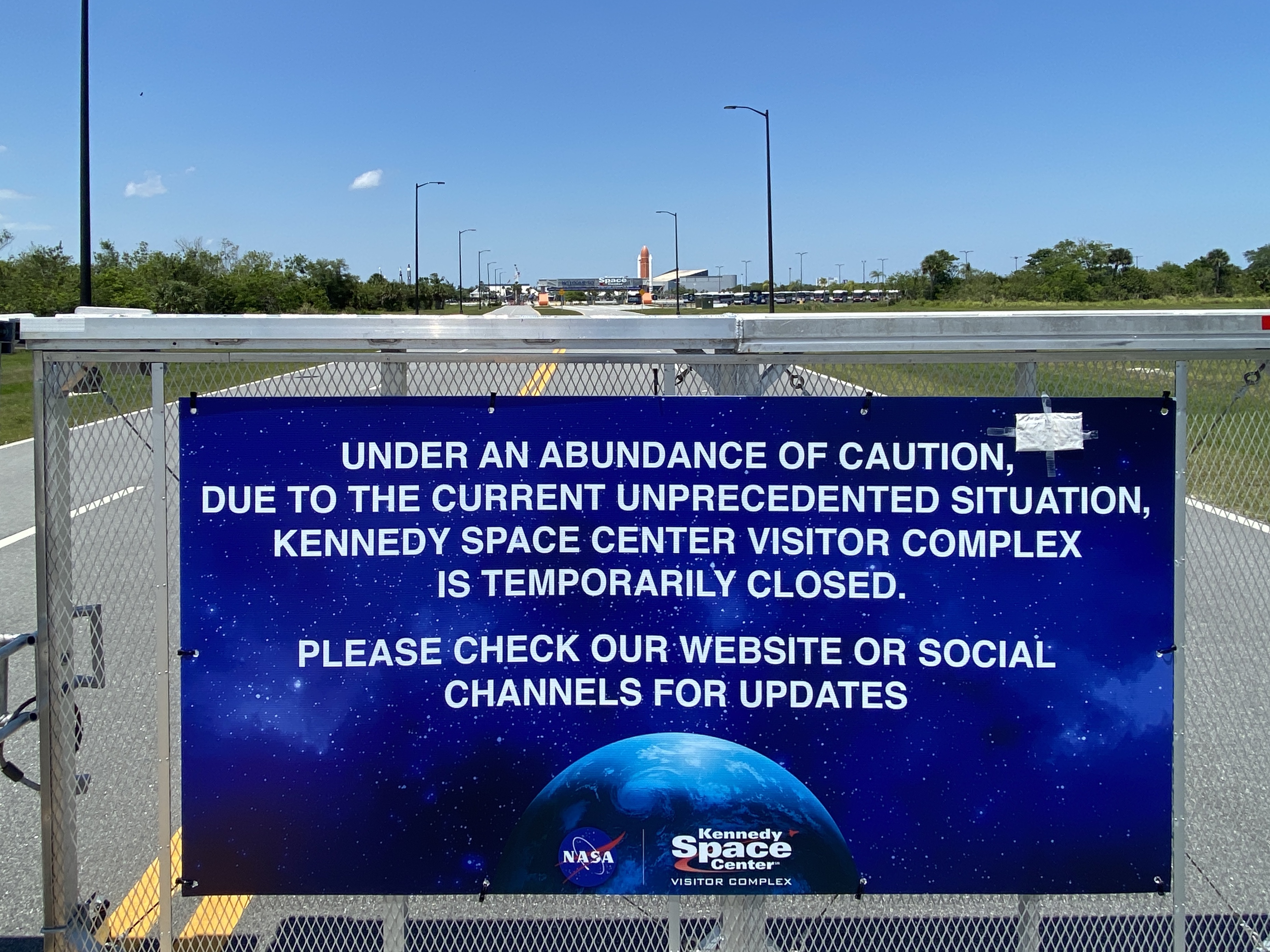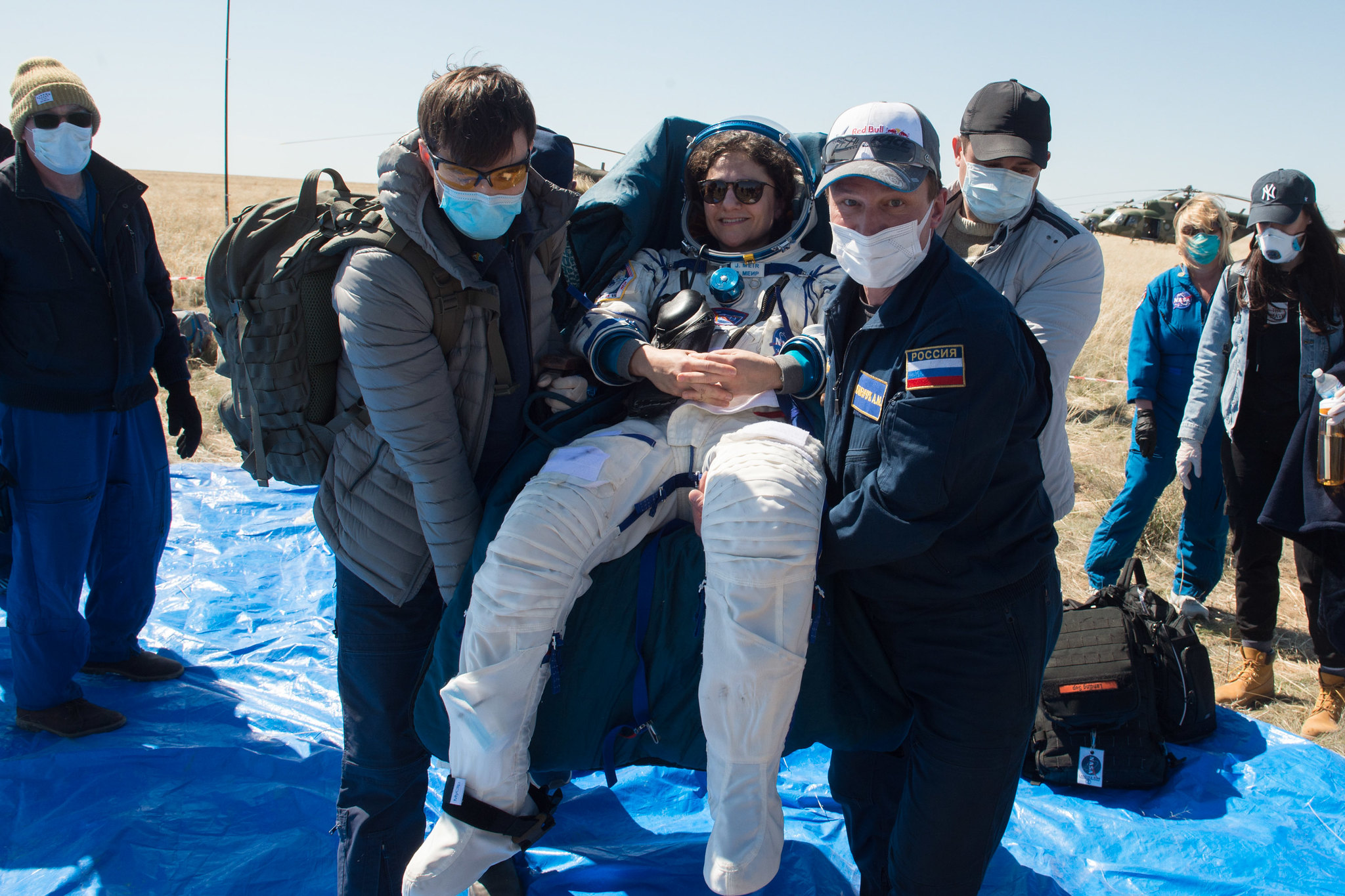SpaceX will make history with NASA astronaut launch next week. But will it draw crowds to Florida?
NASA wants spectators to stay home amid the COVID-19 pandemic.
NASA's first crewed launch from U.S. soil since 2011 was supposed to be a triumphant return for Florida's Space Coast. As for so many milestones this year, however, a global pandemic has changed that calculus.
For nine years, ever since the space shuttles retired, NASA has relied on Russian Soyuz capsules launched from Kazakhstan to send its astronauts into orbit. During that time, Florida's Cape Canaveral and Kennedy Space Center launchpads have stuck to robotic and cargo missions, and tourism to the area has suffered from the absence of astronaut flights. All that will change next week, with SpaceX's Demo-2 crewed test flight scheduled to blast off May 27 on a Crew Dragon spacecraft.
There's just one problem: Travel, celebrations, social gatherings and even just leaving the house unnecessarily have been out of fashion for months, sometimes banned by law, as public health officials scramble to slow the spread of the novel coronavirus and the respiratory disease it causes, COVID-19.
"[The launch] was going to be a circus, both inside the fence and outside the fence, in the local community," Dale Ketcham, vice president for government and external relations at Space Florida, an economic development organization for the industry, told Space.com. "Now, it will still be a big event simply because it can't be constrained, but obviously it's going to be substantially subdued."
Related: How SpaceX's Crew Dragon Demo-2 mission will work in 13 steps
NASA has made clear it would rather space fans stay home. For weeks, agency head Jim Bridenstine has called for people to watch the launch from home, via NASA broadcast, rather than attending in person. And whereas its local visitor center would usually welcome spectators for a launch, that facility is currently closed.
"We’re following CDC guidance, including social distancing, and at this time there’s no public launch viewing at Kennedy Space Center Visitor Complex for NASA’s SpaceX Demo-2 test flight on May 27," Rebecca Shireman, a spokesperson for the visitor complex, told Space.com in an email. "We will continue to monitor the situation and make adjustments to keep our guests and staff healthy."
Breaking space news, the latest updates on rocket launches, skywatching events and more!
The visitor center has announced that it plans to reopen to the public with enhanced safety measures in place on May 28. If the Demo-2 launch is delayed, its backup window is on May 30; the statement does not specify whether the visitor center plans to host launch viewing in the case of a delay.
Tourism and health
But not everyone agrees with NASA that space fans should stay home. The local sheriff, Wayne Ivey, publicly called for people to travel to watch the launch in person in Brevard County, according to Florida Today.
"We are not going to keep the great Americans that want to come watch that from coming here," Ivey said during a May 1 news conference, the paper reported. "If NASA is telling people to not come here and watch the launch, that's on them. I'm telling people what I believe as an American. And so NASA has got their guidelines, and I got mine."
Under normal circumstances, the first crewed flight in nearly a decade would have likely drawn hundreds of thousands of spectators, according to local tourism groups. Ketcham said his organization's baseline attendance estimate for the launch prior to the pandemic's onslaught was a minimum of half a million spectators. (According to Space Florida estimates, the first flight of the Falcon Heavy, perhaps the most recent comparable launch since the retirement of the shuttle, drew 250,000 people.)
In photos: SpaceX's historic Demo-2 Crew Dragon test flight with astronauts
The quirks of scheduling may have also boosted attendance under normal circumstances. "Not only is it the first launch of humans; that always gets the biggest turnout," Ketcham said. "But that is the first launch of humans and it's SpaceX, which brings its own level of interest and excitement and sizzle, if you will, and it's a nice time of day, 4:30, on the week of Memorial Day."
A second local organization, the Space Coast Office of Tourism, expected hundreds of thousands of attendees as well, according to executive director Peter Cranis, who compared the Demo-2 flight to major shuttle launches that could draw 250,000 to 500,000 people and also cited the favorable schedule.
For local businesses, those numbers matter a lot, Cranis said, citing estimates that a family staying overnight for a launch spends about $1,000 and a family coming in for the day spends about $150. "There's a definite economic impact to it," he said.
But tourism numbers are no longer only about dollars; they are also about patients. As of May 18, Florida has seen more than 45,000 infections and more than 2,000 deaths due to COVID-19, according to the state health department. However, cases are concentrated in southern Florida near Miami. Brevard County, which includes the launch sites, has seen more than 350 cases and 11 deaths, according to the same data.
Related: Live updates about the COVID-19 pandemic
And so at the state level, Florida has begun the process of reopening, with restaurants and other businesses beginning to operate on a limited basis. The rapidly changing circumstances may also complicate communications around the pandemic. "As we're reopening in stages, things change every week," Annette Bourgault, an assistant professor of nursing and research scientist at the University of Central Florida, told Space.com. "I think it's difficult for people to keep up."
One certainty is that travel into Florida is permitted, although visitors arriving from New York, New Jersey and Connecticut are required to isolate for 14 days upon entering the state. Restaurants are beginning to seat diners, although at reduced capacity, and hotels are again permitted to offer accommodations.
"We've got the tourism community saying, 'We're ready to receive guests again, we've been through all the cleaning protocols, the hotels are open again to tourists and we're ready and we're able to handle it,'" Cranis said.
His group is emphasizing that spectators should plan ahead if they do intend to travel for the launch, arguing that staying overnight near the coast should get people closer to spacious beaches and reduce the number of cars stuck in traffic.
"What we really would like to see is people planning ahead, maybe staying in a hotel the night before, and then watching the launch from the beach itself, which allows plenty of room to socially distance from other groups," Cranis said.
Ketcham was less sanguine about the risks spectators would face. "The problem is going to be, Where do all these people go to the bathroom and get gas and something to drink?" he said. "It's those choke points that I think is going to be the health risk, not standing watching the launch. But it's going to be what it's going to be, and people are just going to have to try to deal with it as best they can."
Risks and safety measures
Amid the ongoing pandemic, it's challenging to be faced with the sort of event that would normally bring people together, whatever the impetus.
"Graduations and celebrations do carry increased risk," Michael Deichen, a medical doctor who has been grappling with these issues in conjunction with his role leading student health services for the University of Central Florida, told Space.com. "I think everyone needs to be informed as to what creates risk, and they need to personally take steps to reduce their own risk and the risk to others."
That principle means, he and Bourgault emphasized, keeping at least 6 feet (1.8 meters) of distance from others, regularly and thoroughly washing hands, disinfecting surfaces and wearing masks. Those guidelines remain applicable to those who feel healthy, since people with the coronavirus are known to be able to spread it to others without currently experiencing symptoms themselves.
Cranis is confident that space fans are up to taking care of each other and local residents. "We want people to be smart and safe, and we want them to adhere to the CDC guidelines," he said, "but we believe that we can handle those guests and do it in a way that is sensible."
Living close enough to watch launches from her home, Bourgault said she understands the impulse to want to see the historic moment firsthand. But she was more alarmed at the prospect of people traveling during a precarious public health moment.
"Despite asking people to stay home, I know they're going to come anyway," she said. "So I guess the best message is, please, anybody who's watching the launch from places other than their home, remember that we're still in the middle of a pandemic and that the social distancing and masking are still important."
Across the country, responses to coronavirus containment measurements and gradually loosening restrictions have been mixed, Ketcham noted, and next week's launch will be a key setting to see those responses in action.
"It is going to be a very compelling draw to those who choose to sublimate their fears of the pandemic," Ketcham said. "It's pretty evident around the country people are capable of doing that. The wisdom of that is often questionable, but that's not our call."
- In photos: SpaceX's historic Demo-2 Crew Dragon test flight with astronauts
- Relive the historic SpaceX Falcon Heavy launch with 'Starman' in this inspiring video
- Photos of NASA's last space shuttle launch
Email Meghan Bartels at mbartels@space.com or follow her @meghanbartels. Follow us on Twitter @Spacedotcom and on Facebook.
OFFER: Save 45% on 'All About Space' 'How it Works' and 'All About History'!
For a limited time, you can take out a digital subscription to any of our best-selling science magazines for just $2.38 per month, or 45% off the standard price for the first three months.

Meghan is a senior writer at Space.com and has more than five years' experience as a science journalist based in New York City. She joined Space.com in July 2018, with previous writing published in outlets including Newsweek and Audubon. Meghan earned an MA in science journalism from New York University and a BA in classics from Georgetown University, and in her free time she enjoys reading and visiting museums. Follow her on Twitter at @meghanbartels.



